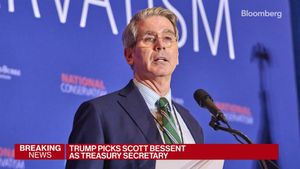The 2024 COP29 climate summit held recently in Baku, Azerbaijan, has garnered widespread criticism, with many observers labeling it as a failure due to unmet climate finance goals and controversies over fossil fuel extraction. Amidst rising global temperatures, activists and media outlets have expressed deep concern over the perceived lack of ambition from participating nations.
The summit was meant to address pivotal climate issues, but instead, it ended up being overshadowed by Azerbaijan's controversial oil and gas rhetoric. President Ilham Aliyev referred to fossil fuels as "gifts from God," triggering backlash from environmentalists and activists around the world who see such remarks as dangerously dismissive of the urgent climate crisis at hand. These comments were particularly galling as COP29 attendees discussed not only climate finance but also the transition from fossil fuels.
Critics pointed out the discrepancy between the financial pledges made and the actual needs outlined by developing countries. The final agreement called for developed nations to mobilize $300 billion annually by 2035 to assist developing countries, but many experts argue this figure falls woefully short of the estimated $1.3 trillion required to effectively mitigate climate change. According to the Council on Foreign Relations, COP29 suffered from poor organization and left participants questioning the effectiveness of the COP process.
Protests at COP29 reflected the intensity of dissatisfaction among both activists and delegates. While representatives from over 200 countries were present, key leaders from highly polluting nations, including the USA, Germany, and Russia, opted to skip the conference. This absence highlighted the summit's struggles to unite the global community for serious climate action.
The discontent surrounding COP29 was palpable as nations expressed disappointment with the final funding commitments. Even the initial proposal of $250 billion per year was seen as inadequate, leading to last-minute negotiations to raise the figure to $300 billion, which the Marshall Islands rejected outright as insufficient for their immediate needs.
It was clear to observers and participants alike: raising expectations around climate finance and then failing to meet them resulted in disillusionment for many developing nations, which had hoped for more ambitious targets and concrete actions.
Adding to the complexity of COP29 discussions was the backdrop of geopolitical tensions, particularly the war in Gaza. Palestinian representatives conveyed the devastating impact of climate change interwoven with international conflicts, arguing the siege has not only ecological consequences but also exacerbates the climate crisis globally. "What’s going on in Gaza is killing all the elements of life,” said Abeer Butmeh, highlighting the urgent need for intersectional approaches to climate action.
Environmental activists decried the presence of numerous fossil fuel lobbyists at COP29, noting their aggressive push for natural gas, touted as the "green fuel." Yet, many recognized it as misleading, as natural gas extraction and processing contribute significantly to greenhouse gas emissions. Campaigners echoed the sentiment: the fossil fuel industry continues to manipulate narratives to sustain its dominance, undermining sincere efforts to transition to cleaner energy sources.
Within the broader narrative of climate action, the effectiveness of COP29 has been tied to the so-called "Great Reset"—a global initiative launched following the COVID-19 pandemic. This agenda has faced increasing pushback, with both public opinion shifting against perceived elitist control of climate policy and economic constraints limiting progress.
World Economic Forum discussions earlier this year suggested a need to pivot away from ambitious climate goals due to plummeting public trust and the unfeasible demands of previous agendas. Amid these shifting tides, many have speculated whether COP29 signals the beginning of the end for the current model of international climate negotiations—a model perceived as increasingly ineffective.
Among the suggested reforms, experts propose rigorous standards for hosting COP conferences, aiming to prevent nations reliant on fossil fuels from orchestrally shaping the agenda. Advocates argue for increased transparency and accountability to interject ambitious climate targets from bottom-up initiatives rather than top-down mandates often driven by wealthy nations. Former UN officials Ban Ki-moon and Christina Figueres have been vocal about the need for transformative changes within the COP structure, as observers increasingly point to the system’s flaws.
Despite these challenges, many believe there remains worthwhile potential for smaller, ambitious coalition efforts outside the traditional COP framework, allowing countries more committed to radical climate action to drive meaningful progress. The debate around COP29 serves as both a reflection on the current state of climate negotiations as well as a springboard for envisioning future possibilities—strategizing how to break away from entrenched interests linked to fossil fuel dependency.
Moving forward, climate activists and advocates alike must continue fighting for genuine action, challenging the global elite, and calling for systemic change rooted not just in addressing climate issues, but considering justice for all impacted communities. The conversations sparked at COP29 around equitable climate finance and accountability frame the path toward what any potential climate agreement must incorporate: real action, authentic inclusiveness, and adherence to principles of justice.
So as COP29 closes its doors, the pressing question remains: will the world continue to falter under the weight of ineffective agreements, or will this serve as the rallying point for the global movement truly called upon to save our planet?



